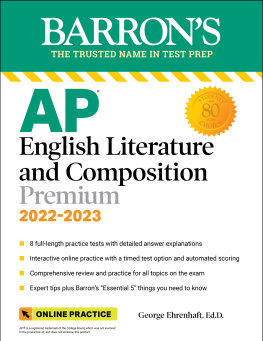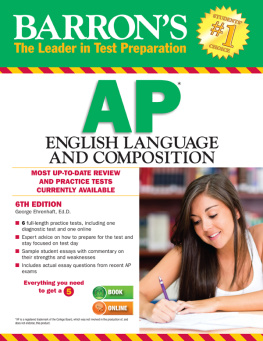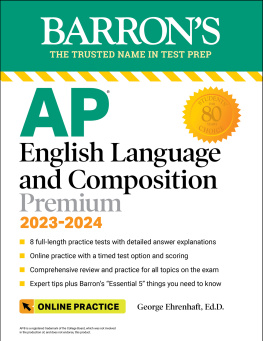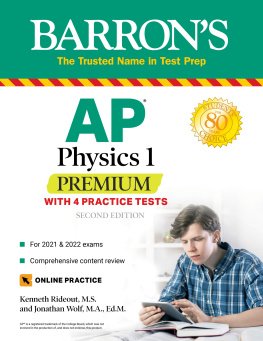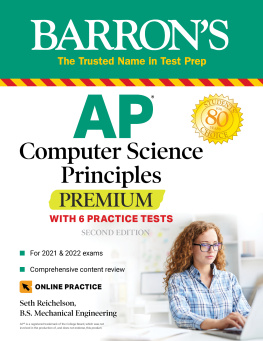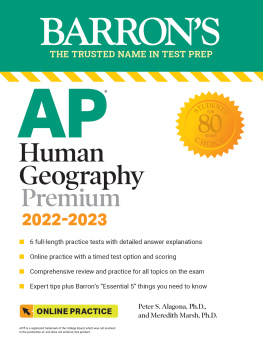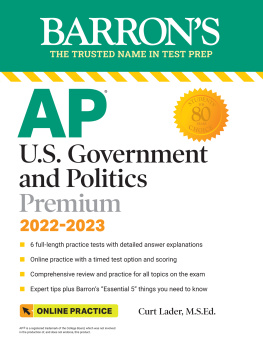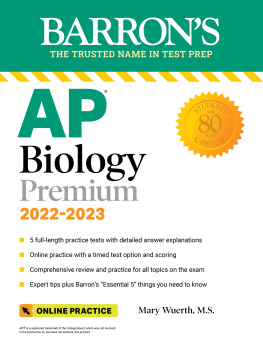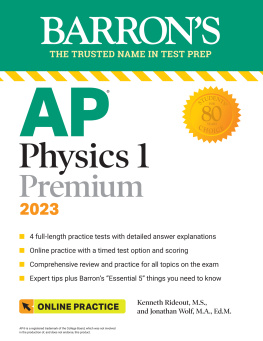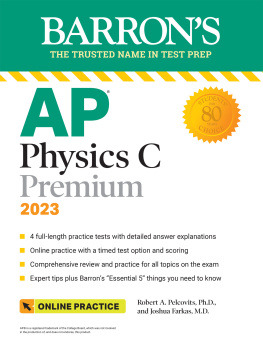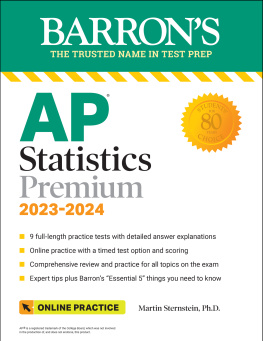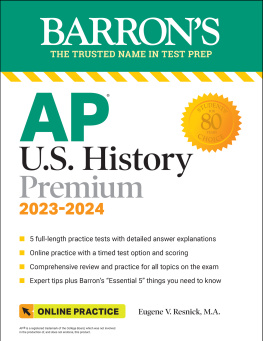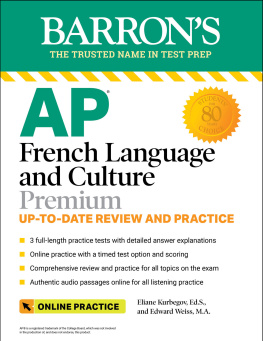Table of Contents
Guide
Page List
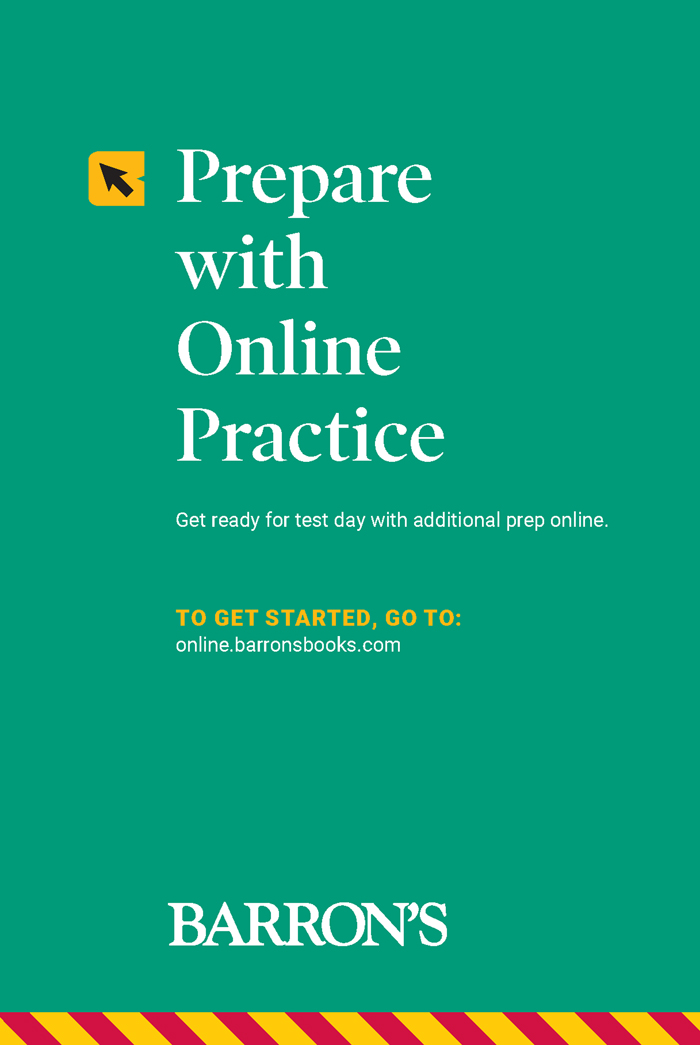

Copyright 2022, 2020, 2018, 2016, 2014, 2012, 2010, 2008 by Kaplan, Inc., d/b/a Barrons Educational Series
Previous edition Copyright 2004 under the title How to Prepare for the AP English Literature and Composition. Prior editions Copyright 2000, 1997, 1992, 1987, 1984, 1980, and 1974 under the title How to Prepare for AP English by Kaplan, Inc., d/b/a Barrons Educational Series
All rights reserved.
No part of this book may be reproduced in any form or by any means without the written permission of the copyright owner.
Published by Kaplan, Inc., d/b/a Barrons Educational Series
1515 W Cypress Creek Road
Fort Lauderdale, FL 33309
www.barronseduc.com
ISBN: 978-1-5062-7964-0
10 9 8 7 6 5 4 3 2 1
All rights reserved under International and Pan-American Copyright Conventions. By payment of the required fees, you have been granted the non-exclusive, non-transferable right to access and read the text of this eBook on screen. No part of this text may be reproduced, transmitted, downloaded, decompiled, reverse engineered, or stored in or introduced into any information storage and retrieval system, in any form or by any means, whether electronic or mechanical, now known or hereinafter invented, without the express written permission of the publisher.
About the Author
During his thirty-plus years as a high school English teacher, George Ehrenhaft introduced many hundreds of students to the riches of literature. He aimed to show how plot, character, and voice serve not only as a means to convey what authors and poets hope to say in their writings but also, more important, to stimulate students to explore their own nature and discover thoughts and feelings residing within themselves. In short, he aimed to stimulate students not only to aim for 5s on AP exams but to engage in a lifelong quest to learn what it means to be human.
In addition to AP books on literature and language, he has written books on ACT and SAT preparation, on English grammar, on writing college application essays, and based on his personal experienceof all thingson the joys and frustrations of being a do-it-yourself home builder.
Table of Contents
Most readers of this book are either currently taking an AP English course or about to begin one. If that describes you, this book can accompany you as a friendly and informed companion between now and May, when AP exams are given. Use it as a supplement to classwork. Refer to it often as a way to reinforce what youve learned. Let it tutor you on matters that youve found elusive or hard to master. You might ask an AP teacher who knows your strengths and weaknesses to recommend parts of the book to study.
Diagnostic Test
First, take the Diagnostic Test to gain an understanding of your strengths and weaknesses. It is a complete test with answer explanations and includes rubrics for the essay questions.
Review and Practice
As stated above, this book includes the right amount of review that fully aligns with the six big ideas and nine units of study for short fiction, poetry, and longer fiction. In addition, each chapter contains samples and practice.
Practice Tests
The final section of the book offers the opportunity to take four full-length practice tests that include all question types found on the actual exam. A comprehensive answer explanation is provided for each multiple-choice question, and a sample essay and rubric are provided for all writing. Take all of the practice tests, of course. Theyre meant to give you that extra edge that turns a good AP score into a better one.
Online Practice
There are three full-length online practice exams. You may take these exams in practice (untimed) mode or in timed mode. All questions include answer explanations.
For Students
This review book highlights the key concepts in each unit and explains them by giving content and examples. How you use the book depends on how your school offers the course. Nevertheless, by following the strategies and by taking the practice tests, you will have an indication of how well you will do on the actual exam. As you prepare for the exam, study each chapter of this book, take the practice tests, and check your answers. Revel in the correct ones but let the wrong answers steer you to sections of the book for you to review. Then in May, take the exam with confidence. Ill be rooting for you on test day!
Best of luck,
George Ehrenhaft
For Teachers
Many of your fellow teachers use this book as a resource. It can lighten your load because it contains a great deal of what an AP Lit course typically contains, including selected reading passages, important literary terminology, analyses of prose and poetry, sample essays with evaluations, exam questions, and several AP tests with answers fully explained. The literature discussed in these pages may or may not already be a part of your AP course. Questions and answers throughout the book are intended to stimulate thinking and inspire students to write the kinds of in-depth analyses required on AP exams. Naturally, I hope you find this book helpful. If you have ideas for revising it for future editions, please send me a note via the publisher.
To reach your goal of on the AP English Literature and Composition exam, here are five essentials you MUST do:
| Recognize literary terms. To answer both the multiple-choice and essay questions, you should know not only the meaning of such literary terms as structure, style, theme, imagery, symbolism, and irony, but also how these concepts function in fiction and poetry. |
| Develop the habit of annotation. Analyze a page-long prose passage from a work of literary merit. Read it once for an overall impression. Then read it again, this time on the lookout for such features as the word choice, tone, use of detail, sentence structure, and figures of speech. Describe the authors purpose and how it is achieved. To boost your performance on both the multiple-choice and essay questions, practice annotationevery day. |
| Become a poetry consumer. A steady diet of poems will deepen your understanding of poetry, a major feature of the AP exam. Read poems every day. For each one, answer the ten crucial questions on designed to help you analyze and comprehend the purpose and meaning of the poems you read. With practice, youll soon see how structure, sound, meter, and other elements give poems the power to move, entertain, and enlighten. |
| Read widely and well. Test questions about literature range from the meaning of an entire novel or play to the interpretation of a poetic word or phrase. Every dimension of literature is fair game. Be prepared by immersing yourself in high-quality works from various periods. Read thoroughly. Take nothing for granted. Assume that every component in the work contributes to the meaning of the work as a whole. Make an effort to contemplate and analyze: plot |

